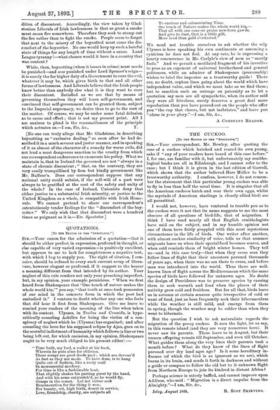QUOTATIONS.
[TO TEE EDITOR OF THE "SPECTATOR."]
SIR,—Your canon for the admission of a quotation—that it
should be either perfect in expression, profound in thought, or else capable of very varied expression—is positively excellent, but appears to me to lack for completeness a negative test, with which I beg to supply you. The right of citation, I con- ceive, should be refused to every such current scrap of litera- ture, however elegant or profound, if it suggest to the hearer a meaning different from that intended by its author. Your neglect of this rule renders not only your preaching imperfect, but, in my opinion, your example pernicious. "When we first heard from Shakespeare that One touch of nature makes the whole world kin," you say, " that truth at once took possession of our mind in the concrete form in which the poet had embodied it." I venture to doubt whether any one who feels that did hear it first from Shakespeare. Give me leave to remind your readers of the meaning of the line when taken with its context. Ulysses, in Troilus and Cressida, is hypo- critically consoling Achilles for being the victim of a con- spiracy of neglect which he (Ulysses) has organised; and after consoling the hero for his supposed eclipse by Ajax, goes on to the scornful indictment of humanity which follows (a line or two being left out, for which omission, in my opinion, Shakespeare ought to be very mach obliged to his present editor) :—
"Time bath, my lord, a wallet at his back,
Wherein he puts alms for oblivion.
Those scraps are good deeds past ; which are devour'd As fast as they are made. To have done, is to hang Quite out of fashion, like a rusty mail
In monumental mockery.
For time is like a fashionable host, That slightly shakes his parting guest by the hand, And with his arms outstretch'd, as he would fly, Grasps in the comer. Let not virtue seek Remuneration for the thing it was ; For beauty, wit, high birth, desert in service, Love, friendship, charity, are subjects all To envious and calumniating Time.
One touch of Nature makes the whole world kin,— That all with one cons,3nt praise new-born gawds,
And give to dust, that is a little gilt, More laiid than gold o'erdusted."
We need not trouble ourselves to ask whether the wily Ulysses is here speaking his own sentiments or assuming a cynicism he does not feel. At any rate, he is expressing a hearty concurrence in Mr. Carlyle's view of men as "mostly fools." And we permit a mutilated fragment of his invective to pose as an exponent of universal brotherhood and general politeness, while an admirer of Shakespeare (presumably) wishes to label the imposter as a trustworthy guide ! There are, no doubt, orphan lines going about the world which have independent value, and which we must take as we find them ; but to sanction such an outrage on paternity as to let a quotation say men are all sympathetic, when its author said they were all frivolous, surely deserves a great deal more reprobation than you have poured out on the people who offer
you "the cup that cheers, but not inebriates," and leave you "alone in your glory."—I am, Sir, &c.,
A CONSTANT READER.


































 Previous page
Previous page